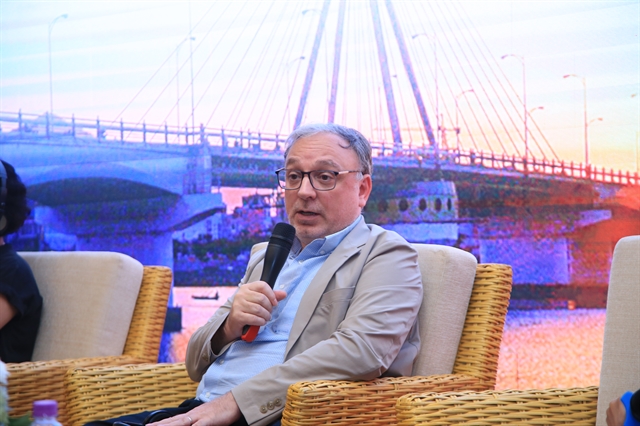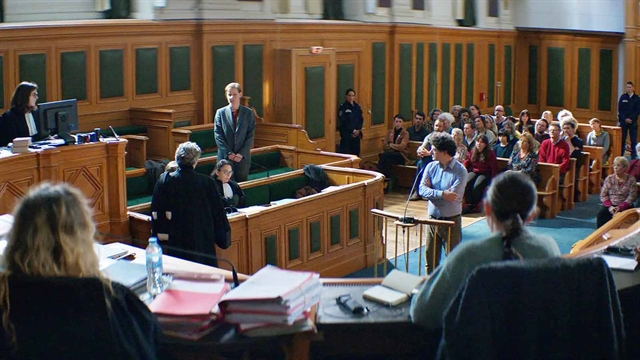Jeremy Segay is the Regional Audiovisual Attache of the French Ministry for Europe and Foreign Affairs to Việt Nam, Cambodia, Laos, Myanmar and Thailand, working in the fields of cinema, music and television.
He has made considerable contributions to the development of Asian cinema, taking on many positions in film festivals such as the Deauville Asian Film Festival, Asia-Europe Foundation, Singapore International Film Festival, and Malaisie: Le Cinéma. From 2003 to 2011, Segay worked as Asia Specialist and Film Selector for the Directors' Fortnight Section at the Cannes Film Festival.

Jeremy Segay, the Regional Audiovisual Attache of French Ministry for Europe and Foreign Affairs to Việt Nam, Cambodia, Laos, Myanmar and Thailand. Photo courtesy of Anh Vũ/DANAFF
Việt Nam News reporter Trần Khánh An talked with him about relations between French and Vietnamese cinema on the sidelines of the 2024 Đà Nẵng Asian Film Festival (DANAFF II) early this month.
How were the films that were shown in DANAFF II's Spotlight on French Film programme chosen?
We make our selections based on two requirements. The films must be successful and represent the cooperation between Vietnamese and French cinema. We selected L’Amant (The Lover) by Jean-Jacques Annaud, a film from the early 1990s, to be presented for the very first time uncut on a big screen in Việt Nam.
We also selected several well-known French films that took home numerous honours and awards – the most recent ones going to Anatomie d'une chute (Anatomy of a Fall) and La Passion de Dodin Bouffant (The Taste of Things).
Previously, the French Institute in Việt Nam screened French films on the institute's campus, which attracted a big audience, but it has since been discontinued. Does the French Institute in Việt Nam plan to relaunch this programme?
I would like to make it clear that we changed the plan for promoting French cinema in Việt Nam. On the French Institute campus, we no longer screen films. Instead, we collaborate with film theatres to present films every week on Wednesday and Saturday nights in big cities including Hà Nội, HCM City and Đà Nẵng. Each year, we feature about fifty new French films in Việt Nam.
Now, the French Institute is doing a far better job of introducing Vietnamese audiences to French cinema. We live in an economic cycle - the more films we screen, the more people come to see them and the wider distribution we have. When our partners notice higher profits, they are also willing to increase showtimes for French films.

A scene in the film 'Anatomie d'une chute' (Anatomy of a Fall). Photo courtesy of Le Pacte
What programmes does the French Embassy deploy to support the development of Vietnamese cinema and the relations between French and Vietnamese cinema?
We have deployed many collaborations, cinema seminars and film co-production projects between France and Việt Nam.
We participate in the Autumn Meeting – a rendezvous for Vietnamese and international filmmakers, providing training courses on acting, film direction and producing low-budget films. We also organised cinema seminars at the Hồ Chí Minh City International Film Festival and DANAFF as well.
We have also recently started supporting new sectors including visual effects and animation. These seem like very promising sectors for the cinema industry and we look forward to working together with Việt Nam in this field. We also discussed with DANAFF and the Autumn Meeting's organisers inviting French experts to teach breathing control and voice acting, as well as training makeup for horror films.
We support Vietnamese film crews in attending international film festivals. We sent Vietnamese film crews to the Cannes Film Festival for two years in a row.
We also have a fund to support Vietnamese films to help them present in the Vietnamese market itself and to encourage the diversification of different film genres in the Vietnamese market. Specifically, we promote award-winning Vietnamese films to make their debut in their home country. Culi Never Cries, which recently took home the GWFF Best First Feature Award from the Berlin International Film Festival, was the first movie that the fund financed.
Culi Never Cries is highly anticipated by cinephiles in Việt Nam. Can you tell more about how the fund supported the film's release?
We facilitate advertising and promotions to increase the film's exposure to more Vietnamese audiences and encourage them to see it in a theatre. Specific details are upon the plan by the film crews. VNS
OVietnam